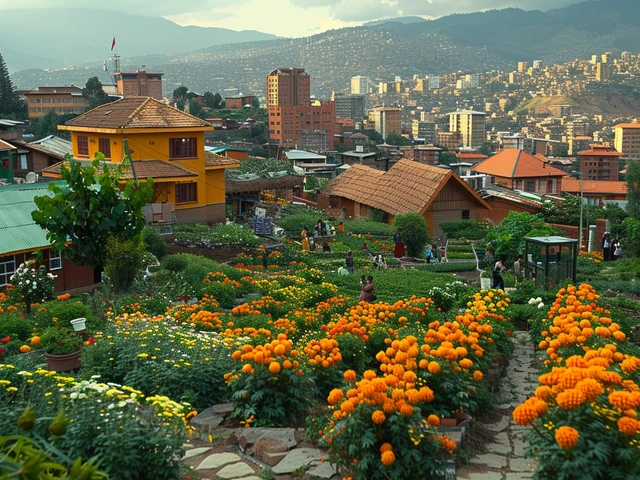Ethiopia, a country rich in history and culture, can be an intriguing place to live. But beneath its vibrant traditions lies a myriad of challenges that residents grapple with daily. Economic struggles, insufficient infrastructure, and limited access to healthcare are just some of the hurdles.
While these issues make life difficult, understanding and addressing them can pave the way for a more manageable existence. In this article, we'll delve into the reality of living in Ethiopia and share practical tips on navigating everyday challenges. By shedding light on these factors, we hope to provide insight and support for those who call Ethiopia home.
- Economic Challenges
- Infrastructure and Transportation
- Healthcare Hurdles
- Educational Barriers
- Cultural and Social Dynamics
- Coping Strategies and Tips
Economic Challenges
Living in Ethiopia comes with a unique set of economic challenges that impact daily life. The country has been striving for economic development, but many residents still encounter financial obstacles. One of the primary issues is the high inflation rate, which erodes purchasing power and makes it difficult for families to afford basic necessities. The World Bank reported that Ethiopia's inflation rate reached 33% in 2023, significantly affecting the cost of living.
Employment opportunities are often limited, especially outside major cities like Addis Ababa. Many Ethiopians rely on agriculture for their livelihoods, but this sector is prone to challenges such as droughts, pests, and market instability. Additionally, the informal economy plays a significant role, with numerous individuals engaged in small-scale trade, which lacks job security and steady income. This makes it even harder for people to plan their finances or save money.
The Ethiopian birr, the national currency, has experienced devaluation over the years. This fluctuation adds another layer of complexity to daily life, as import costs soar, making certain goods unaffordable. For example, electronic devices, vehicles, and even some types of food are imported, and their prices have increased sharply, putting these items out of reach for many. Such economic instability makes budgeting and financial planning a challenge for the average Ethiopian.
Access to financial services is another hurdle. Banks and formal financial institutions are concentrated in urban areas, leaving rural communities underserved. This limits opportunities for savings, loans, and other financial tools that can help individuals manage their economic situations better. Even when financial services are available, there can be trust issues and a lack of financial literacy, which prevent people from maximizing these resources.
“Economic challenges in Ethiopia are multifaceted and deeply rooted in structural issues. Addressing them requires comprehensive strategies and long-term commitment,” said Alemayehu Geda, an economist from Addis Ababa University.
Moreover, governmental policies and regulations can sometimes be unpredictable, adding to the uncertainty. Businesses, particularly small and medium enterprises, often find it difficult to navigate the bureaucracy, which can stifle innovation and growth. Additionally, tax policies and import restrictions can be burdensome, further complicating the business environment.
To make the most of their economic situation, many Ethiopians resort to creative solutions. This includes participating in community savings groups, also known as “eqqubs,” where members pool their resources and support each other financially. Such grassroots initiatives play a crucial role in providing financial stability and fostering a sense of community and cooperation.
For expatriates and newcomers, understanding these economic dynamics is essential. Adapting to the economic environment requires careful financial planning and a willingness to engage with local communities and resources. By being aware of the financial challenges and proactively seeking solutions, it is possible to navigate the economic landscape in Ethiopia more effectively.
Infrastructure and Transportation
Ethiopia's infrastructure and transportation system reflect the country's development challenges and opportunities. Addis Ababa, the capital city, houses the bustling Bole International Airport, one of Africa's busiest hubs, which symbolizes both progress and limitations. The roads connecting the metropolis to rural areas often have potholes and washouts, making travel slow and unpredictable. This is evident in areas like the remote Afar region, where unpaved roads are common.
Public transportation in Ethiopia, primarily buses and minibuses, fills the gaps left by less comprehensive road networks. However, these vehicles are frequently overcrowded, and schedules can be unpredictable. The light rail system in Addis Ababa, introduced to alleviate congestion, is a step forward, yet its reach is limited to the capital. In rural areas, options may shrink to donkey carts or walking long distances.
Electricity access remains inconsistent, posing another significant hurdle. Frequent power outages, termed 'load shedding,' can last several hours, affecting businesses, education, and household chores. The growth of renewable energy projects like hydropower and wind farms offer hope, though they require time and investment to become reliable and widespread.
"Despite notable steps forward in urban infrastructure, rural Ethiopia still lags behind. Continuous investment and development are crucial to bridge this gap," says Dr. Tedla Mariam, an economist and infrastructure expert.Water and sanitation infrastructure also face challenges. Many rural communities rely on rivers and streams for water, which can lead to health issues. Urban areas are better served, but water shortages are still common. The government and numerous NGOs are working to provide better access to clean water, but progress is gradual.
In urban settings, housing developments are burgeoning to accommodate the rising population. However, slum areas are expanding as well, highlighting the urgent need for affordable housing. Construction projects often stall due to delays in material supplies and financial constraints, contributing to housing shortages.
For travelers and new residents, understanding these challenges is key to navigating life in Ethiopia. Tips to manage include adapting to variable schedules, keeping emergency supplies for power outages, and utilizing local knowledge for safe and reliable transport options. While the roads and services may not always be dependable, a proactive approach can help ease the daily grind.
Healthcare Hurdles
One of the most significant challenges of living in Ethiopia is access to quality healthcare. Although the government has made efforts to improve the healthcare system, many people still face considerable difficulties. Hospitals and clinics are often under-resourced and overcrowded, with many facilities lacking basic equipment and medicines. This situation makes it hard to get timely and effective medical care when needed.
The distribution of healthcare services is also uneven. Rural areas are particularly disadvantaged, with few medical centers and limited access to specialists. People living outside urban centers often have to travel long distances to find affordable treatment, which can be difficult due to poor infrastructure and transportation. This situation is reflected in health statistics, where rural populations show higher rates of mortality and morbidity due to preventable diseases.
Another pressing issue is the shortage of trained healthcare professionals. Many doctors and nurses choose to move abroad for better opportunities, leaving the country with a critical shortage of skilled medical staff. This brain drain exacerbates the problem and puts excessive strain on the remaining healthcare workers. Constantly overwhelmed, these professionals often struggle to provide adequate patient care.
There's also the matter of affordability. Even though Ethiopia has tried to implement universal health coverage, many people still find it expensive. Insurance schemes are limited and are not available to everyone. As a result, people often have to pay out-of-pocket for their medical expenses, which can be a significant financial burden for many families.
In urban areas like Addis Ababa, private healthcare facilities offer better services but at a higher cost. This situation creates a disparity where only the wealthier segment of the population can afford quality medical care. Preventive care is another area that needs more attention, as many Ethiopians cannot access regular check-ups and vaccinations. This lack of preventive measures often results in late-stage diagnosis of diseases, making treatment more complicated and expensive.
In 2019, the World Bank reported that only 39% of births in Ethiopia were attended by skilled health staff. This statistic highlights the gap in maternal and child healthcare services. Despite efforts to improve maternal health, many women still face life-threatening conditions during childbirth, and infant mortality remains a critical issue.
According to Dr. Tedros Adhanom Ghebreyesus, Director-General of the World Health Organization, "Investing in healthcare infrastructure and training is crucial for Ethiopia's development. It is vital to ensure that all Ethiopians have access to quality healthcare services regardless of their geographical location or economic status."Community health programs have shown promise in addressing some of these issues. Programs focusing on training community health workers to provide basic healthcare services in rural areas have helped improve access to care. These workers can administer vaccinations, offer prenatal and postnatal care, and educate communities about hygiene and disease prevention. Although these initiatives are beneficial, they are not a substitute for a well-resourced healthcare system.
Addressing healthcare challenges in Ethiopia will require a multifaceted approach. Investments in infrastructure, better training for healthcare professionals, and expanding health insurance coverage are all critical steps that need to be taken. Moreover, a focus on preventive care and strengthening community health programs can help mitigate the adverse effects of a strained healthcare system. By tackling these issues head-on, Ethiopia can make significant strides in providing quality medical care for all its citizens.
Educational Barriers
In Ethiopia, access to education remains a significant challenge for many. The country has made strides in improving its educational system, but numerous barriers still persist. One major issue is the scarcity of well-trained teachers, affecting the quality of education that children receive. In many rural areas, schools are understaffed, and teachers often lack the necessary resources to effectively teach their students.
Another obstacle is the lack of infrastructure. Many schools, especially in remote regions, lack basic facilities like classrooms, libraries, and laboratories. Students often have to learn in overcrowded and poorly maintained buildings, which hampers their educational experience. This lack of infrastructure is further compounded by the scarcity of educational materials such as textbooks and teaching aids.
Access to schools can also be a significant barrier. Children in rural areas may have to walk several kilometers just to reach the nearest school. This long journey can be arduous and unsafe, particularly for young children, and can lead to high dropout rates. Additionally, many families rely on their children's labor for agricultural work, which can further limit their time and ability to attend school.
A quote from the UNESCO highlights the issue:
"Ethiopia has made significant progress in expanding access to education, but quality and equity remain major challenges."
The economic situation of families also plays a crucial role in educational access. Many families cannot afford the costs associated with schooling, such as uniforms, supplies, and transportation. This financial strain can force children to abandon their studies to support their families financially. While some initiatives aim to support these families, the reach and impact of such programs can be limited.
Gender disparity presents another layer of difficulty. Although progress has been made in closing the gender gap, girls, especially in rural areas, are less likely to attend school than boys. Cultural norms and expectations often prioritize boys' education over girls. Additionally, teenage pregnancy and early marriages are common issues that derail girls from continuing their education.
Understanding and addressing these barriers is critical for improving the educational landscape in Ethiopia. To enhance the situation, various strategies can be adopted. Investing in teacher training programs ensures that educators are well-prepared and equipped to provide quality education. Improving infrastructure by building more schools and refurbishing existing ones can create a better learning environment. Moreover, providing educational resources like books and technology can significantly enhance the learning experience.
Encouraging community involvement and raising awareness about the importance of education can also make a substantial difference. Communities that value education are more likely to support their children's schooling. Implementing outreach programs to educate parents about the long-term benefits of education can help shift cultural norms and encourage more children, especially girls, to stay in school.
Ultimately, while the challenges are significant, focusing on sustainable solutions and collaboration between the government, non-governmental organizations, and local communities can lead to meaningful improvements. By tackling these educational barriers head-on, Ethiopia can pave the way for a brighter future where every child has the opportunity to learn and thrive.
Cultural and Social Dynamics
Ethiopia boasts a rich tapestry of cultures and traditions that are both fascinating and, at times, challenging to navigate. The country is home to over 80 different ethnic groups, each with its own unique customs, languages, and social norms. This diversity can be enriching, offering a broad spectrum of experiences and perspectives. However, for newcomers or even some locals, adapting to these various cultural expectations can be daunting.
One of the most prominent aspects of Ethiopian culture is its communal nature. Family ties and community bonds are extremely tight, and social gatherings are frequent. However, for someone used to more private or individualistic lifestyles, this can feel overwhelming. The concept of sharing and collective responsibility is deeply embedded in daily life. For instance, the traditional coffee ceremony is not just about drinking coffee but is a time-honored way of fostering community ties and sharing news.
Language barriers can also pose significant challenges. While Amharic is the official language, dozens of other languages are spoken across the country. This can make communication difficult, especially in rural areas where less common dialects prevail. Learning the local language can go a long way in easing this hardship, but it's a task that requires time and effort. According to a study by the Ethiopian Ministry of Education, only about 30% of the population is proficient in Amharic, highlighting the importance of linguistic adaptability.
The social dynamics are further complicated by gender roles. Traditional expectations often place women in domestic roles, although this is slowly changing in urban areas. Men generally have more public-facing roles, which can create a stark divide in daily experiences. Understanding and respecting these roles while advocating for gradual change can be a balancing act. A quote from Helen Taddese, a social activist, encapsulates this struggle:
"While Ethiopian women are cornerstones of their families and communities, they often face immense societal pressures that limit their opportunities for personal growth."
Religious diversity also plays a significant role in shaping social dynamics. The country is primarily comprised of Ethiopian Orthodox Christians, Muslims, and Protestant Christians. These religious groups often live in close proximity, which requires a high level of tolerance and understanding. Religious holidays and observances are a crucial part of life and can affect everything from work schedules to social plans. Being mindful of these traditions and showing respect can help in building good relationships.
Understanding local attitudes towards time is another important aspect of social dynamics in Ethiopia. In many parts of the country, there is a different perception of time compared to more fast-paced cultures. Punctuality is often flexible, and plans can be changed at the last minute. This can be frustrating for those used to strict schedules but learning to adapt and being patient can make life much smoother. This cultural flexibility can actually be a blessing, as it allows for a more relaxed and less stressful lifestyle once one becomes accustomed to it.
For expatriates and visitors, taking the time to learn and appreciate these cultural nuances can make a huge difference in their experience. Simple actions like participating in local festivals, showing respect for elders, and learning basic phrases in the local language can go a long way in fostering goodwill. It's a journey of discovery that, while challenging, can also be immensely rewarding.
Coping Strategies and Tips
Living in Ethiopia comes with its own set of challenges, but there are several coping strategies and tips that can help ease daily life. Understanding and implementing these can make a significant difference in dealing with the common obstacles faced by both locals and expatriates. One of the first steps to coping effectively is community engagement. The Ethiopian people are known for their strong sense of community and mutual assistance. Forming relationships with neighbors and local groups can provide essential support and resources in times of need.
Another crucial strategy is adaptability. Given the unpredictability of infrastructure and utilities, it’s important to remain flexible and prepared for sudden changes. Having backup plans for power outages, water shortages, and transportation disruptions can make these inconveniences more manageable. Investing in a good quality generator and water storage system, for example, can help mitigate the impact of these challenges on your daily activities.
Financial resilience is also vital. Due to economic instabilities, having a diversified income source can provide a safety net. Engaging in various forms of livelihood, such as small-scale farming, side businesses, or freelance work, can offer additional security. Additionally, understanding the local market dynamics and currency fluctuations can help in making informed financial decisions.
Healthcare access can be another significant hurdle, so it’s important to establish a reliable network of healthcare providers. Keeping a well-stocked medical kit and having contacts of trusted doctors can be invaluable, especially in emergencies. Staying informed about common health issues and preventive measures, such as vaccinations and hygiene practices, can also promote better health outcomes.
For those with children, prioritizing education is essential. While the educational infrastructure may have limitations, seeking supplementary educational resources can enhance learning. Online courses, tutoring, and educational workshops are excellent ways to complement school education. Encouraging children to engage in extracurricular activities can also contribute to their overall development and well-being.
Lastly, cultural and social adaptability is a major asset. Embracing local customs, learning the language, and participating in cultural events can enrich your experience and help build meaningful connections. This openness can also foster mutual respect and understanding, which eases daily interactions.
"Ethiopia's communal culture is its backbone. Social support networks can make the difference between merely surviving and thriving," says Dr. Almaz Alemu, a sociologist at Addis Ababa University.
Here are some practical tips to keep in mind:
- Build a support network within the community.
- Have backup plans for utility disruptions.
- Diversify income sources.
- Find and maintain reliable healthcare providers.
- Supplement education with additional resources.
- Embrace local culture and traditions.
By following these strategies and tips, life in Ethiopia can become not just bearable, but enjoyable and rewarding. The resilience and resourcefulness cultivated here can offer unique and valuable life lessons.

 Best Business Opportunities in Ethiopia for 2024
Best Business Opportunities in Ethiopia for 2024
 The 7 Essential Occupations: A Deep Dive into Career Choices
The 7 Essential Occupations: A Deep Dive into Career Choices
 How to Launch a Successful Business in Ethiopia: Essential Steps and Tips
How to Launch a Successful Business in Ethiopia: Essential Steps and Tips
 Ethiopia's Challenges: Unveiling the Nation's Weaknesses
Ethiopia's Challenges: Unveiling the Nation's Weaknesses
 Understanding Maximum Overtime Hours in Ethiopia: A Comprehensive Guide
Understanding Maximum Overtime Hours in Ethiopia: A Comprehensive Guide
Christopher Boles
July 7, 2024 AT 20:36Living in Ethiopia definitely comes with its share of hurdles, but the community spirit there can make a big difference. Connecting with neighbors and joining local groups often provides a safety net when things get tough. Simple steps like sharing resources during power cuts or helping each other with water collection can ease daily stress. Also, learning a few Amharic phrases goes a long way in building trust and finding hidden opportunities. Stay patient and keep a positive attitude, and you’ll find ways to thrive despite the challenges.
Crystal Novotny
July 26, 2024 AT 09:03While many applaud community resilience it’s also true that constant reliance on informal networks can trap people in cycles of dependency
Reagan Traphagen
August 13, 2024 AT 21:29The system is rigged and everyone knows it.
mark sweeney
September 1, 2024 AT 09:56I read the article and felt compelled to call out the naïve optimism it spreads. The reality on the ground is far messier than any feel‑good narrative can capture. You can’t just say “join a community group” and expect it to solve deep structural problems. Corruption seeps into every layer of the public sector, from local councils to national ministries. Roads are pothole‑riddled because contracts are handed to cronies who cut corners. Power outages aren’t just “load shedding” they’re a symptom of a failed energy policy driven by foreign interests. The health system collapses because doctors flee for better pay abroad, leaving clinics understaffed. Even the so‑called eqqubs are under constant pressure from middlemen who skim off savings. Inflation isn’t a random number, it’s pumped by monetary manipulation that benefits a tiny elite. Education suffers as textbooks are printed abroad and never reach rural schools on time. Cultural traditions are often weaponized to keep populations passive and accepting of hardship. International NGOs claim to help, yet they rarely coordinate with local leaders, creating duplicate efforts. Anyone who thinks a simple tip list will fix these issues is either ignorant or willfully blind. The government talks about reforms, but the real agenda is maintaining control over resources. In short, the challenges are systemic and require more than polite advice – they demand accountability and grassroots activism.
randy mcgrath
September 19, 2024 AT 22:23I see where you’re coming from and agree that surface‑level solutions rarely cut it. Still, small acts of solidarity can build the momentum needed for larger change. When people share knowledge about reliable clinics or safe water sources, they create a living knowledge base that survives bureaucracy. It’s also worth remembering that not every initiative is perfect, but collective effort often outpaces single‑handed criticism. By staying engaged and encouraging others to do the same, we can gradually shift the balance toward real improvement.
Frankie Mobley
October 8, 2024 AT 10:49Exactly, community bonds are the backbone of resilience here. Keep fostering those connections and offering practical help, and you’ll see the ripple effect in everyday life. Simple gestures like organizing a shared generator schedule or a bulk‑buy water system make a real difference. Stay optimistic and keep learning – the challenges are tough, but together they become manageable.